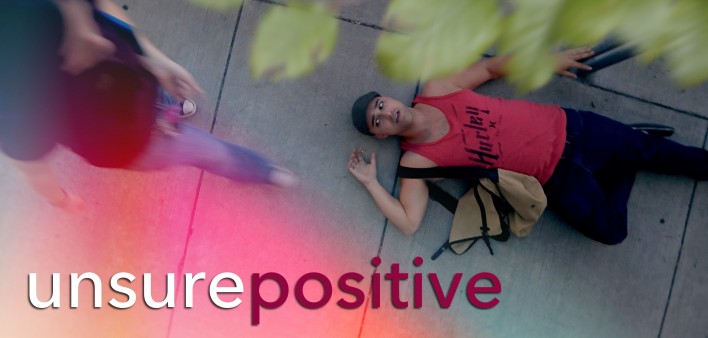Like the majority of filmmakers, my pursuit of a bona-fide career in the industry has been fraught with false hope, deafening silence, and occasional victories.
One such victory, in my case, was the decision to create an autobiographical narrative about my life. Specifically, my experience being diagnosed with HIV, and living with it.
As you already know, HIV is “no longer a death sentence.” But while I was pursuing my degree in Media Art at Emerson College, I had to become an expert on fictional HIV narratives in mainstream media. So I surveyed dozens of narratives (films, television episodes, TV movies ... anything with a broad audience) and I noticed something that bothered me. In nearly every film, or for that matter any traditional popular media featuring an HIV positive protagonist, the story would either conclude with their death, or leave the audience with the implicit certainty that they would die.
It seemed weird.
I’ve been living with HIV since 2007, and the best information I have tells me that I may, in fact, live longer than the average American male, seeing as I go to the doctor more often than someone who isn’t infected. And from all this arose a challenge: I was going to make a relatable, “mainstream” show about an HIV positive character whose struggle isn’t framed by impending death, but by life. Ongoing, no less. It seemed only logical that I should create a serialized narrative -- instead of a feature film, I would make a series about living with HIV, and all that goes with it.
Long story short, I wrote a pilot episode for an hour long drama -- with some comedy mixed in. It was based on people and places and situations in my life. I called it Unsure/Positive. In order to make it public, I decided to re-lease it online as a web series. After all, what good would such a series be without its aforementioned “mainstream” audience?
“What’s the big deal,” you ask, with a touch of nihilism. “Everyone has a web series. My goldfish just finished a web series. Web series are dead.”
Well, firstly, I think you should chill out. Everyone’s a critic these days, and your rhetoric is tired.
The trick to making yourself stand out in the crowd, the path to becoming a fully realized taste-maker, is to watch everything ever. Everything. Ever. Most people, myself included, can’t do that. We make an effort, but that Netflix subscription is dangerous; you may find yourself opting for the comfortable “will they or won’t they” of a nice, sedating Sam and Diane re-watch instead of firing up the Vimeo app on your set-top box or mobile device.
iTVfest in Vermont told me I’d need either a famous actor or a famous show runner to even be considered for a pick-up. But since I had no big names attached to my project, Vimeo seemed like the perfect fit for my show, because Unsure/Positive is actually the most personal, emotional, and intimate project into which I’ve ever invested my efforts as an in-dependent filmmaker. And as far as the industry is concerned, that’s probably all I’ll ever be: independent.
Vimeo claims to be “... the high-quality video platform for creators and their audiences. Vimeo’s mission is to empower and inspire people around the world to create, share, and discover vide-os.” For the most part, I’ve found this to be true. But no web-based video content hosting service is perfect. Here’s the laundry list of stuff which has given me pause:
When I was using Vimeo’s UI for creating my Vimeo On Demand page, the thumbnail for my series’ trailer was usurped by the thumbnail I chose for episode one of the series. After contacting support multiple times, I was eventually told that this is simply “how it works,” and that nothing could be done to change it. To this day, I am bothered by this detail. I’ve had to compromise the look of my landing page on the site with a redundant image for both the trailer and the first episode. Worse, it won’t play my episodes sequentially on the Roku, according to a friend.
They didn’t Staff Pick me. Not even a little.
People keep asking me if my content is on YouTube.
Here are the upsides:
I’m able to monetize my content directly, which hopefully will pay to keep the series online and available for awhile, and possibly raise money to continue producing the show for a second season.
I can create coupon codes to let people watch the series without paying the paltry $2.99 price point -- these free passes help with my PR efforts.
I am blessed with the awareness of analytics; I know that only a tiny fraction of the people I reach out to with coupon codes watch the show.
I don’t have to deal with asinine content policies, like I would have had I released the show on YouTube.

Creator Christian Daniel Kiley takes a moment between takes.
And yet. Even with all these tools, even after constantly promoting my work on social media, I am not growing my audience. I am, however, Facebook friends with dozens of successful HIV activists. Danny Pintauro is my Facebook friend. Sean Strub, who I’ve long considered a role model, is also my Facebook friend, and we even had a phone conversation once while I was in pre-production. Mark S. King has stated that he needs nudging to take the time to watch the show. (Nudge, nudge, Mark!) In the meantime, I am barely making enough sales to pay for the cost of Vimeo’s premium membership and hosting services. I guess what I’m trying to tell you here is that this isn’t for lack of effort on my part.
I’ve gotten great feedback from private screenings of the show here in the Boston area. Better yet, the show was awarded finishing funds in the form of a grant from the Caucus for Producers, Writers & Directors Foundation. They even flew me out to LA for their annual awards dinner. I’ve got bloggers who have never been in the same room with me promoting my show on their websites, and I’ve blogged for a couple of niche sites like POZ.com and The Body.com.
I get positive feedback all the time. Here’s an example from an email I recently received from a viewer whose name I won’t use:
“There is no other show that could possibly deal with the issues I am having right now not just with my identity, but with the public treatment of HIV generally, and with the institutionalized, un-critical discourse of social control upon which policies and programs serving this population--the population of which I am now a part--are based. So good luck. Please push the limits. Please don’t toe the goddamn line. Say something fucking important in addition to something funny and touching.”
Not to mention this, relayed by a friend, from the one and only Jack Mackenroth:
“The acting is good which puts it leaps and bounds above most LGBT productions. And the production value is great as well.”
Danny Pintauro even said this during his recent inaugural Facebook Mentions video: “... it’s really really good -- really interesting. It’s putting [HIV] in the mainstream, and turning it into something people can watch and relate to.”
I get this feedback and I think: “yeah, people need this. It needs to exist.”
So why don’t more people watch? I get pretty worked up about it all, as you can imagine.
I think that’s when I make mistakes.
The biggest mistake I’ve made so far was to waste money on a press release. I went to one of the big PR/newswire sites and spent a pretty penny on alerting the world about the show shortly before its launch.
The traffic spike on Vimeo was noticeable, but the ROI was laughable.
When I decided to bring my show to Vimeo On Demand, I figured that if even one of the niche sites I blog for, or any medium-to-major media review site were to give the show a look, and perhaps some publicity, I might be able to get tens of thousands of viewers -- just enough to start producing season two.
That hasn’t happened, obviously, but it still could happen. If Unsure/Positive was selected as a Vimeo Staff Pick, it would be a no-brainer -- better still, if they optioned my second season as a Vimeo Original, like they did for my old friend Adam Goldman, creator of “The Outs,” I’d be happy as a clam. Adam doesn’t really need publicity from me, but I’ll go ahead and plug The Outs anyway, because it’s great. Plus, Sasha Winters is a friend who, along with Ken Breese, were probably the best part of my first web show, A Show About Us.
And why wouldn’t someone take a look at Unsure/Positive? I have a theory I refer to as the Clicker Theory: Imagine yourself clicking through the channels, looking for something to watch. You click past soundbites: “Trump,” click. “Hillary,” click. “next on Bravo,” CLICK. “HIV,” CLICK! CLICK! CLICK!
Nobody wants to watch that thing about a depressing underdog topic, unless that topic has organizational and institutional support, a PR team and a budget to go with it (maybe through some obvious product placement), a holistic plan for making that thing popular enough to overcome the stigma that surrounds it. HIV is still considered a depressing underdog topic in this day and age, despite the hard work of niche media sites like TheBody.com.
Ironic, I suppose, that this perception is the very thing that I set out to change; and even with Vimeo’s intellectual, above-the-fray messaging and marketing, it’s not turning out to be the solution to Clicker Theory.
In the meantime, I’ve given myself a year to continue to try and work with this Vimeo model. After that, I’ll make the series completely free to all. I’ll put it on YouTube, even. If that comes to pass, I’ll have to make the tough decision -- do I dive back into the demoralizing world of crowdfunding to create season two? Or do I graciously bow out and move on to the next project, whatever it may be? Vimeo has the potential to be the Launchpad for a shift in the discourse about HIV; but then, history is replete with groundbreaking shows that never got past their first season. Joss Whedon, if you’re reading this, please watch Unsure/Positive.








Comments
Comments